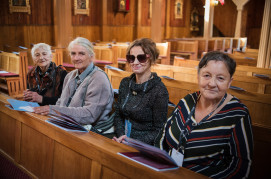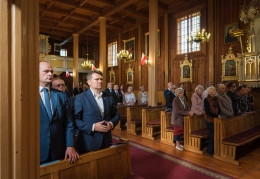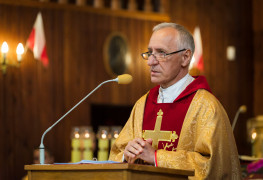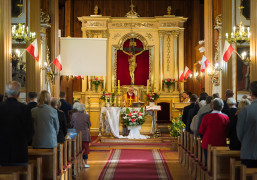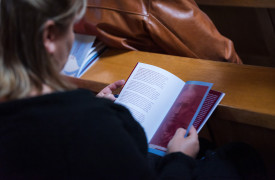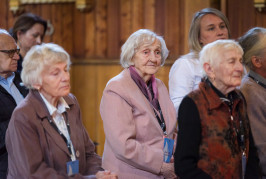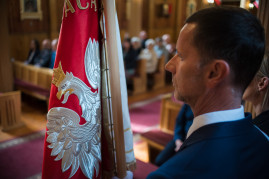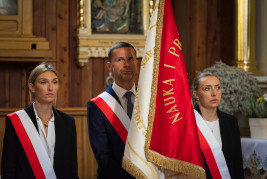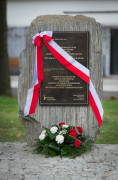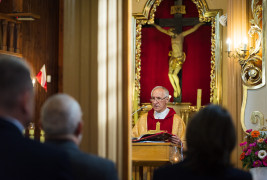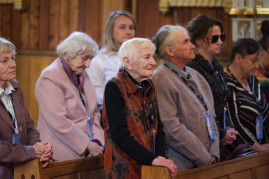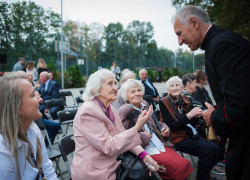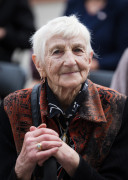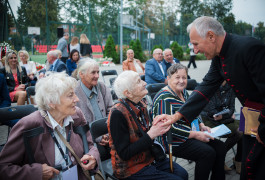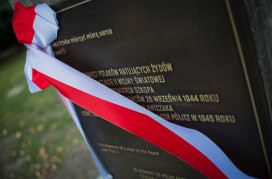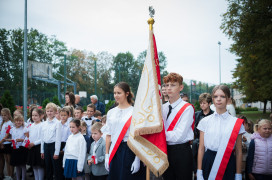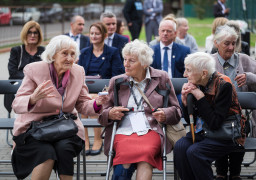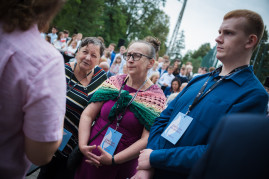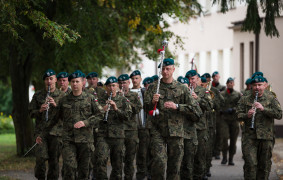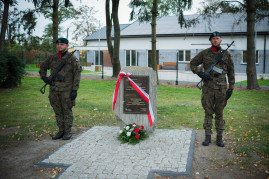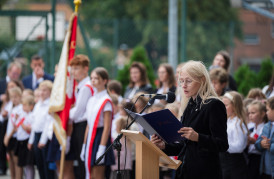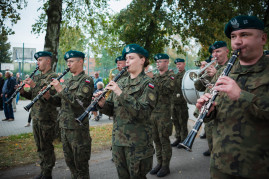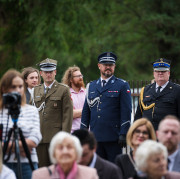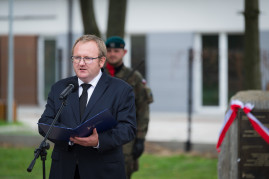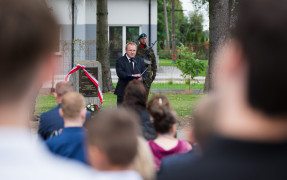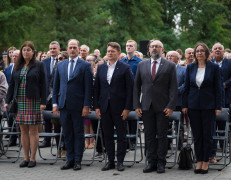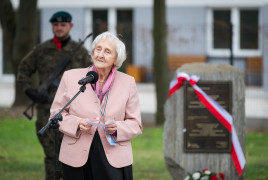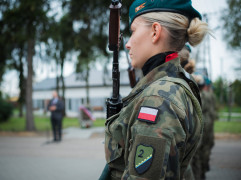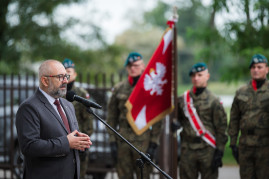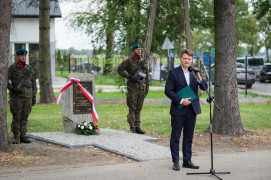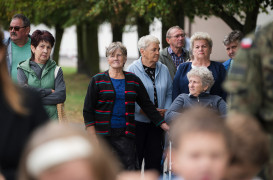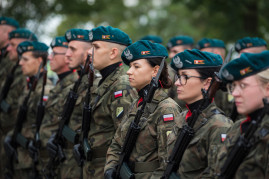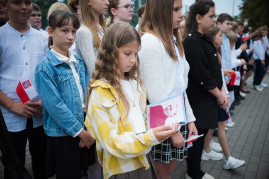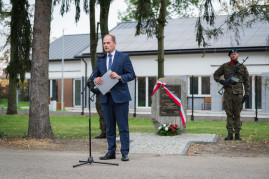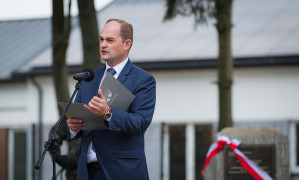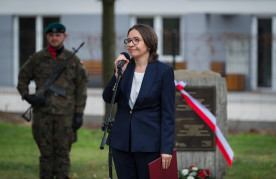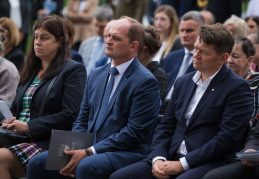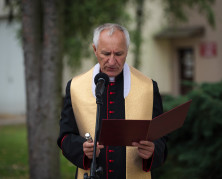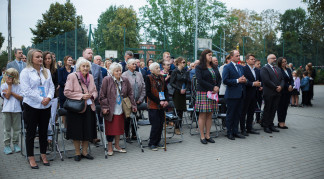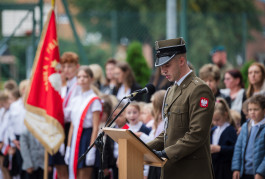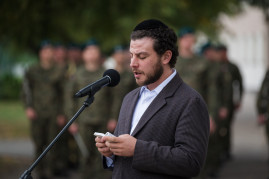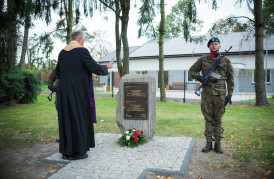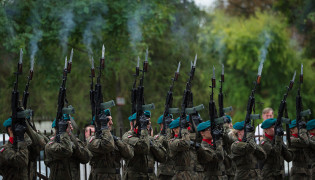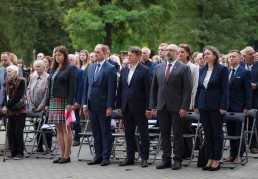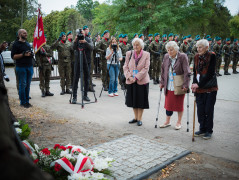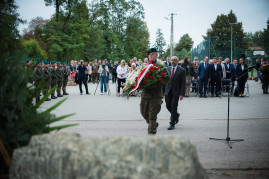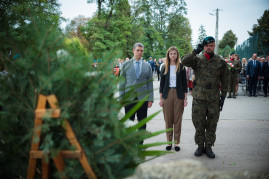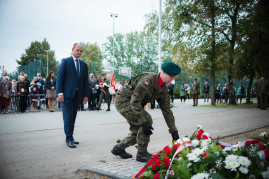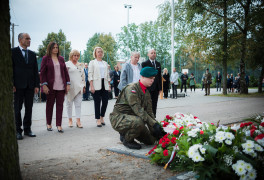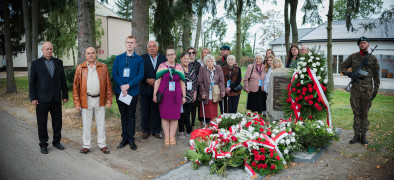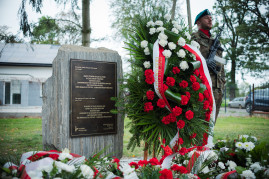The commemoration in Nacpolsk of Franciszek Antczak and Kazimierz Szkop, who were murdered for helping Jews during the German occupation - Instytut Pileckiego
The commemoration in Nacpolsk of Franciszek Antczak and Kazimierz Szkop, who were murdered for helping Jews during the German occupation
On 26 September 2024 in Nacpolsk, we commemorated Franciszek Antczak and his nephew, Kazimierz Szkop, who were murdered for sheltering two Jews – Moszek Kuperman and Josek Lewin – for a year and a half during the German occupation.
The ceremony began with a mass at the St. Sigismund Church in Żukowo. Next, a commemorative plaque was unveiled and flowers were laid in front of the Piotr Sękowski Elementary School in Nacpolsk.
Today we call by name Franciszek Antczak and Kazimierz Szkop, who – in the difficult times of the Second World War – did not hesitate to see their Jewish neighbors as their fellow humans in need.
Their courageous behavior provokes questions about the boundaries of humanity. The humanity which, on the one hand, is responsible for the darkest times of bestial terror, violence and death, but which, on the other hand, gives the power to overcome fear, take responsibility and provide shelter to others despite obvious danger of retaliation for helping members of the Jewish community, wrote Dr. Wojciech Kozłowski, Acting Director of the Pilecki Institute, in a letter to the participants.
Following its unveiling, the monument was blessed by Prelate Janusz Mackiewicz, while Mr. Abraham Hayman recited a prayer for the dead on behalf of the Jewish community. Then the roll call of remembrance was read out and an honorary gun salute was fired.
Dad would be so happy, for he was a very loving, good, warm-hearted person, said Anna Żaczek, the daughter of Franciszek Antczak. I am very proud and happy for my beloved Dad! I walked him to the prison then. Go back, my dear daughter, he said… My youngest brother was 3 weeks old when they took mom away. It hurts a lot, even today. We never had any holiday celebrations. My mom never stopped crying until her death.
The ceremony was organized by the Pilecki Institute in cooperation with Artur Adamski, Starost of Płońsk, and Beata Pierścińska, Head of the Naruszewo Commune.
Apart from the Organizers and representatives of the Commemorated, the ceremony was attended by: MP Mirosław Adam Orliński; Maciej Dybowski, Director of the Office of MP Szymon Hołownia, who represented the Speaker of the Polish Sejm; Senator Krzysztof Bieńkowski; Katarzyna Leciejewska, who represented Minister Lech Parell, Head of the Office for War Veterans and Victims of Oppression; Lieutenant Colonel Tomasz Dziekoński, who represented the Commander of the 2nd Mazovian Sapper Regiment; Inspector Stanisław Dybowski, Chief Police Officer of the District Police Headquarters in Płońsk; Senior Brigadier Artur Czachowski, District Commander of the State Fire Service in Płońsk; Jacek Ryziński, Deputy Starost of Płońsk; Andrzej Pietrasik, Mayor of Płońsk; Andrzej Różycki, who represented Adam Struzik, Marshal of the Mazovian Voivodeship; Andrzej Stolpa, Chair of the Płońsk District Council; Zbigniew Nowicki, Chair of the Naruszewo Commune Council; Wojciech Kała, Manager of the Płońsk Forest District; Prelate Janusz Mackiewicz; Abraham Hayman, who represented Michael Schudrich, Chief Rabbi of Poland.
The ceremony in Nacpolsk was the 37th commemoration as part of the “Called by Name” program, which is dedicated to Poles who were murdered for helping Jews during the German occupation. So far, the Pilecki Institute has “called by name” 97 Poles (including the commemorated from Nacpolsk) who were murdered for assisting Jews during the German occupation. The program has received the Honorary Patronage of the President of the Republic of Poland Andrzej Duda. More about the program (click).
The story of Franciszek Antczak, the Szkop family and the Jews they were helping: Josek Lewin and Moszek Kuperman
Following the defeat of Poland in September 1939, the majority of Polish lands was occupied by the Germans. Northern Mazovia was incorporated directly into the Third Reich as Regierungsbezirk Zichenau, which formed part of Gau East Prussia. The Germans pursued the policy of terror against the local Jewish populace. They concentrated the Jews in ghettos, among others in Ciechanów, Czerwińsk, Mława, Nowy Dwór Mazowiecki, Płock and Wyszogród. In 1942, the German authorities decided to deport Jews from the area to extermination centers operating in the General Government. Those who managed to avoid deportation began a dramatic struggle for survival.
Moszek Kuperman and Josek Lewin were from Wyszogród. Towards the end of November 1941, they were resettled to Czerwińsk. In October 1942, they learned that the Germans were planning another resettlement, this time to Nowy Dwór Mazowiecki. They decided to escape from the ghetto and seek help with Franciszek Antczak, an acquaintance of Kuperman, who lived with his family in Nowy Boguszyn in the Płońsk District (Landkreis Plöhnen). They reached his place on the evening of 3 November 1942. Antczak agreed to shelter them in his barn. He also provided them with food. The hiding place, however, was not safe, as the area was regularly patrolled by the gendarmerie. As detection seemed imminent, Antczak decided that it would be better to move the men to the farm of his sister, Zofia Szkop, who lived in Kolonia Nacpolsk. On the night of 11 November 1942, they were led there by Antczak’s 12-year-old son. The Szkop family was not prosperous. The farm was managed by Zofia, who lived with her seven children in a wooden house. Her oldest son, Kazimierz, helped her with work. Genowefa Domańska (née Szkop), daughter of Zofia, testified years later:
I spent the period of the German occupation in Kolonia Nacpolsk (now called Nacpolsk Nowy) together with my parents and siblings. My father Bolesław died in 1939. After his death, the farm we owned was managed by my mother. In the autumn of 1942 – I can’t give the exact date – two Jews came to our house. I found out one was named Kuperman and the other Lewin. Both were from Wyszogród. They begged my mother and my brother Kazimierz, who was the oldest of the children, to shelter them from persecution by the Nazis. Mother was full of anxiety and fear for her own fate as well as ours, but eventually agreed to take the Jews in. My brother Kazimierz also insisted (1).
At first, Kuperman and Lewin hid in a shed. However, the makeshift shelter was easy to detect, so on the night of 26 November 1942, Kazimierz Szkop suggested that the Jews dig and prepare a bunker together. It was created next to the cowshed, with a hidden entrance. The first construction turned out to be too small, so they proceeded to expand it. Moszek Kuperman testified: Together with Lewin and Szkop we expanded it […]. We supported the walls and ceiling with boards and beams. After the work was completed, we carefully filled in the hole on the side of the yard, and made a special entrance hole inside the barn. […] We made a bunk and a table in the bunker so we could lie down comfortably. We covered ourselves with a quilt when we slept […]. In order for us to be able to illuminate the bunker at least a little, Mrs. Szkop gave us an oil lamp (2).
The Szkop family provided food at the bunker. Sometimes Kuperman and Lewin also came to the house, and Kazimierz and his siblings visited them in their hiding place. The Jews often went out at night to get fresh air. They stayed at the farm for a year and a half. For their stay and food, they gave Zofia around 1,800 marks and a few pieces of clothing.
In late January 1944, Moszek Kuperman decided to visit his friends in Wyszogród. However, he was captured by officers of the local gendarmerie while on the road near the village of Mała Wieś. Taken to Gestapo headquarters, he was subjected to a brutal interrogation and revealed the location of his hiding place. On 2 March, Gestapo officers arrested Zofia Szkop and Josek Lewin, who was hiding in the bunker. They also searched the farm. However, they failed to arrest Kazimierz Szkop, who was absent from home at the time. The Gestapo did not apprehend him until 24 March 1944, when they once again came to Kolonia Nacpolsk to gather photographic documentation of the bunker. The repression also targeted Zofia’s oldest daughter, Genowefa, who was deported for forced labor. In the course of the investigation, the German secret police also established that Franciszek Antczak had been involved in hiding Jews. He was arrested on 27 March 1944. His daughter, Anna Antczak-Żaczek, testified after the war: I don’t remember the date, it was in the winter of 1944 – a Gestapo car pulled up in front of our house. I don’t know where these Germans had come from. Later, there were rumors in the village that it was the Gestapo from Płock. I don’t know those Germans from the Gestapo. When my father saw them through the window, he ran away into the fields. I was only in the house for a while. I saw one of the Germans approach my mother. Mother fell over. I escaped from the house and – as I was running away, I got caught on the fence and hung there by my dress until my brother found me. One of those Jews was with the Gestapo at the time. I think it was Kuperman, he was in handcuffs. On that day, the Germans took only my mother. They held her in custody in Czerwińsk. The next day, my father himself reported to the Gestapo in Czerwińsk, hoping they would release our mother in exchange for him. As he left, he said that he would not be able to bring us up himself. That evening, my mother returned and my father was arrested (3).
In July 1944, the trial of Zofia Szkop and her son Kazimierz took place in Płock. The German prosecutor accused them of hiding and feeding Jews, as well as illegally slaughtering animals, and requested the death penalty for both. Eventually, Zofia’s sentence was commuted to three years at a penal camp. The harshest punishment was applied to Kazimierz. In addition, he was fined 5,000 marks, which was changed for 50 days in a prison camp. In August 1944, Zofia Szkop was sent to the women’s prison in Fordon near Bydgoszcz – one of the harshest prisons for women in Gau Danzig-West Prussia. The prisoners were forced to perform hard labor. Zofia managed to return home in the spring of 1945, after Bydgoszcz was occupied by Polish and Soviet troops. Her son Kazimierz was transported from Płock prison to the Investigative Penitentiary in Königsberg on 5 August 1944. Even there, Kazimierz tried to save his own life; he wrote a request for clemency to the provincial president of East Prussia. Unfortunately, on 12 September, a decision upholding the sentence was delivered. At 3:05 p.m. on 26 September 1944, two officers led Kazimierz to his execution at the prison at 2/4 Berneckerstrasse. He was murdered on a guillotine. His corpse was placed in a previously prepared coffin and handed over to an official from the anatomy institute. The execution protocol states: “From the leading of the condemned to the handing over to the executioner, 3 seconds elapsed, from that moment to the execution of the death penalty – 3 seconds” (4).
Initially, Franciszek Antczak was placed under preventive arrest for an indefinite period. A Gestapo report stated: “Antczak has proved that although he is a Pole, he is in favor of Jewishness and the strengthening of its role. Furthermore, he has presented himself as a person who does not wish to participate in the peaceful reconstruction of the incorporated eastern territories. Should he be released, it is to be expected that he will continue his practice (sheltering people from outside the village or bandits). Referring him to a concentration camp – level II – is therefore both urgent and necessary” (5). On 26 April 1944, Franciszek Antczak was transported from Płock prison to the Stutthof concentration camp. He stayed there until at least the end of July 1944. He was then sent to a branch of the camp located in Police near Szczecin (Außenlager Pölitz), where prisoners worked in a synthetic petrol plant. There was a high mortality rate due to the terrible sanitary conditions and the devastating work. Franciszek’s last letter to his family is dated 5 January 1945. It has not been possible to establish the exact date of his death.
Josek Lewin and Moszek Kuperman were sent to Auschwitz-Birkenau on 20 May 1944. They remained at the camp until the end of January 1945. Facing the advance of the Red Army, the Germans organized a deportation of prisoners to the Reich. Josek Lewin managed to escape from the transport at a Czech train station. He made his way to Poland, to Soviet-occupied areas. After the end of the war, he emigrated to the United States. According to the documents gathered at the Arolsen Archives, Moszek Kuperman reached the concentration camp at Buchenwald on 22 January 1945. He was probably liberated there, but his further fate remains unknown.
Witness accounts
The hiding place for Jews was organized in the barn, where a large pit resembling a real room was prepared. Our visitors had a couch there, and we provided them with everything they needed. They went out in the evenings and at night. They often came to our house. We, i.e. myself and my siblings, sometimes went to the hiding place to keep them company. For instance, my brothers would play cards with our visitors. They were Moszek Kuperman and Josek Lewin. […] One time, Kuperman left the hiding place and went to his friends near Wyszogród. On his way back, he happened to be detained by the gendarmes, who had a dog with them. The unfortunate Kuperman must have been beaten, for he revealed his hiding place to the gendarmes. A large group of Germans, I think they were Gestapo men, came to our place. […] They had no trouble finding the hiding place and arrested Lewin. All household members were told to go out to the yard. I thought that we would all be shot dead. Only my brother Kazimierz was absent from home at the time. As some commotion ensued, I managed to escape through a gap in the barn wall. In the evening, after the Germans had left, I returned home and learned that the Gestapo men had taken Lewin and our mom. And so we, the children, were left on our own.
Minutes from the interrogation of witness Jadwiga Domańska, née Szkop, on 24 November 1994, file ref. no. AIPN, Bu 392/1164, p. 107.
The Germans drove us all out to the yard. They dragged Lewin out of the hiding place. My brother Kazimierz was absent from home at the time. The Germans took away Lewin and our mom. I was left in the care of my older siblings. My brother Kazimierz was in hiding, but eventually he was also arrested when the Gestapo men came a month later and found him at home. My mom and brother Kazimierz were put before court. The trial took place in Płock, where mom was sentenced to a penal labor camp (somewhere near Bydgoszcz) and Kazimierz was unfortunately sentenced to death. The sentence was carried out in Königsberg. I know that he wrote a goodbye letter to us before his death. My mother returned home in April 1945 (she died of natural causes in 1968). As I learned from my family, Lewin survived the war. In 1946, my mom ran into him in Wyszogród.
Minutes from the interrogation of witness Halina Irzyk, née Szkop, on 24 November 1994, file ref. no. AIPN, Bu 392/1164, p. 112.
The story of the commemorated and selection of quotations: Dr. Wojciech Cedro
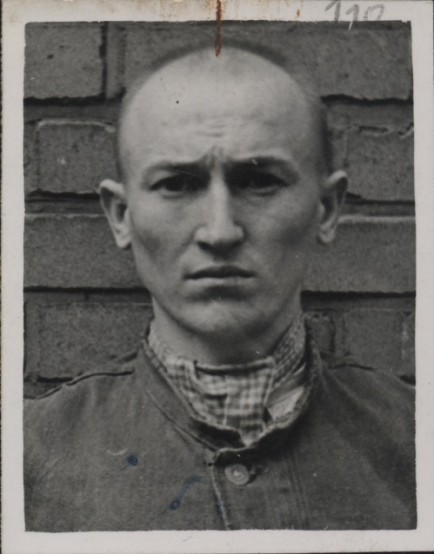
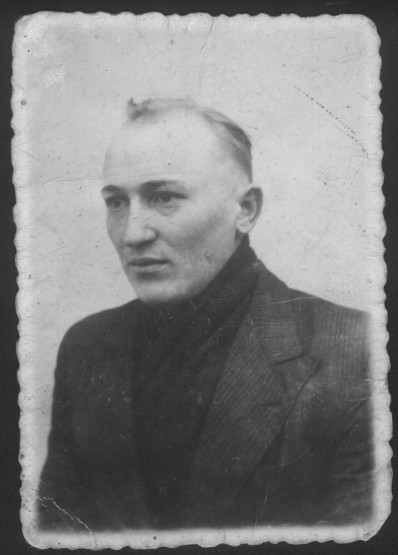
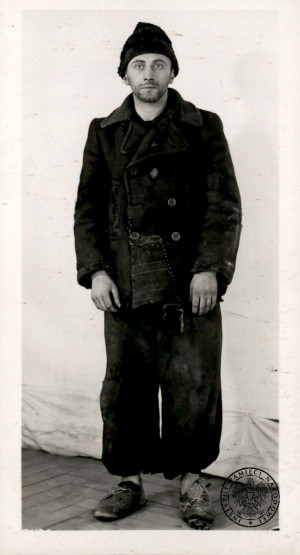
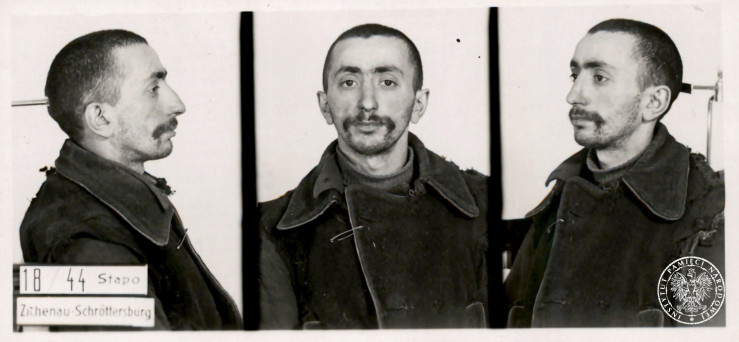
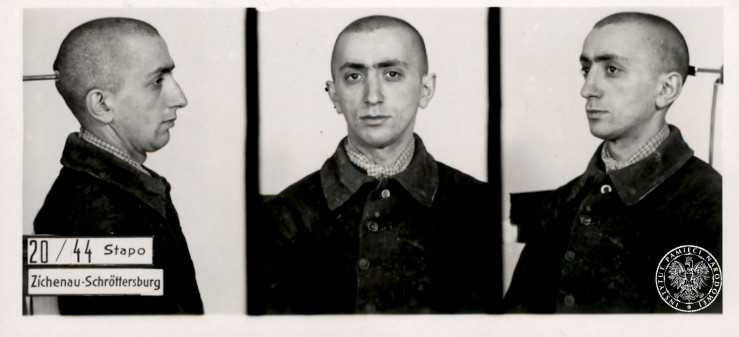
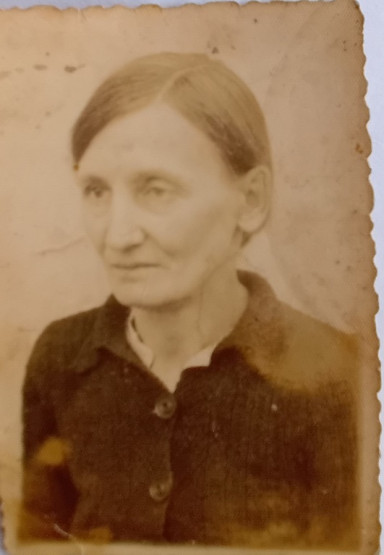
- AIPN, BU 392/1164, vol. 1, Protokół przesłuchania świadka Genowefy Domańskiej z dn. 24 listopada 1994 roku [Minutes from the interrogation of witness Genowefa Domańska on 24 November 1994], p. 107.
- AIPN, GK 629/2473, Protokół z czynności urzędowej zeznanie Moszka Kupermana z dn. 3 marca 1944 roku [Minutes of the official testimony of Moszek Kuperman dated March 3, 1944], p. 43 [translated from the German by the Pilecki Institute].
- IPN-OKŚZpNP w Warszawie, S 9/03/Zn., vol. 2, Protokół przesłuchania świadka Anny Antczak-Żaczek [Minutes from the interrogation of witness Anna Antczak-Żaczek], p. 280.
- Bundesarchiv, B 162/28162, p. 14 [translated from the German by the Pilecki Institute].
- AIPN, GK 629/27, p. 8 [translated from the German by the Pilecki Institute].
